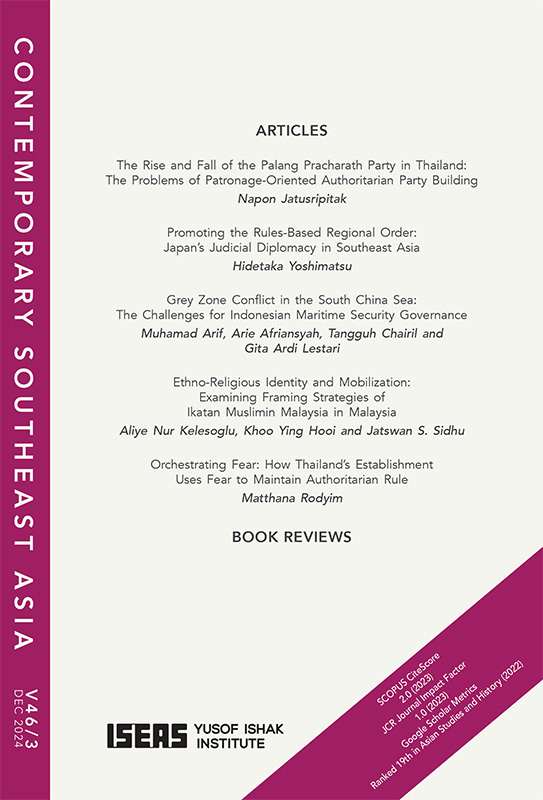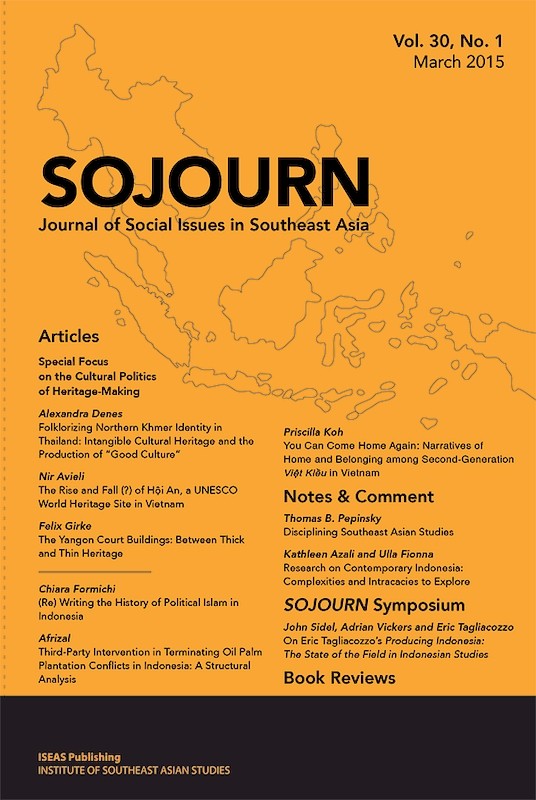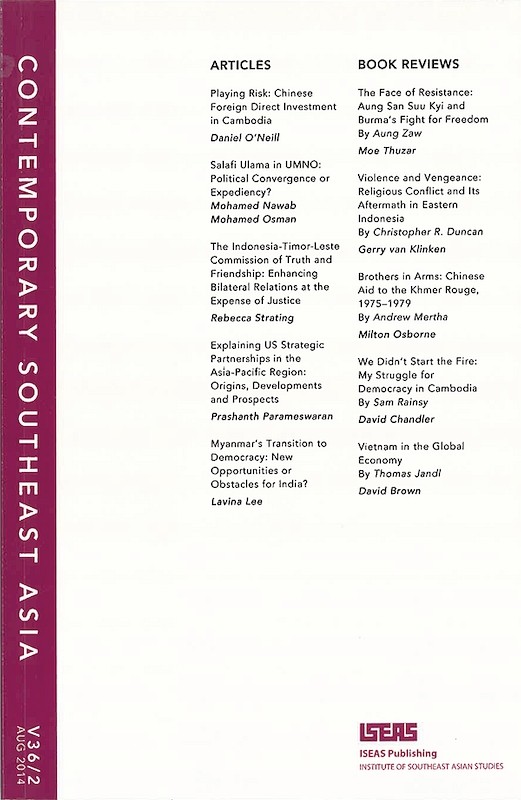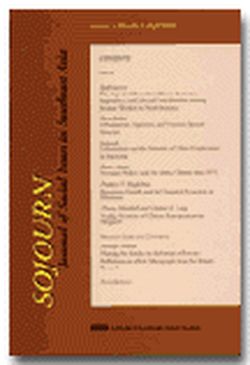SOJOURN: Journal of Social Issues in Southeast Asia Vol. 19/1 (April 2004)
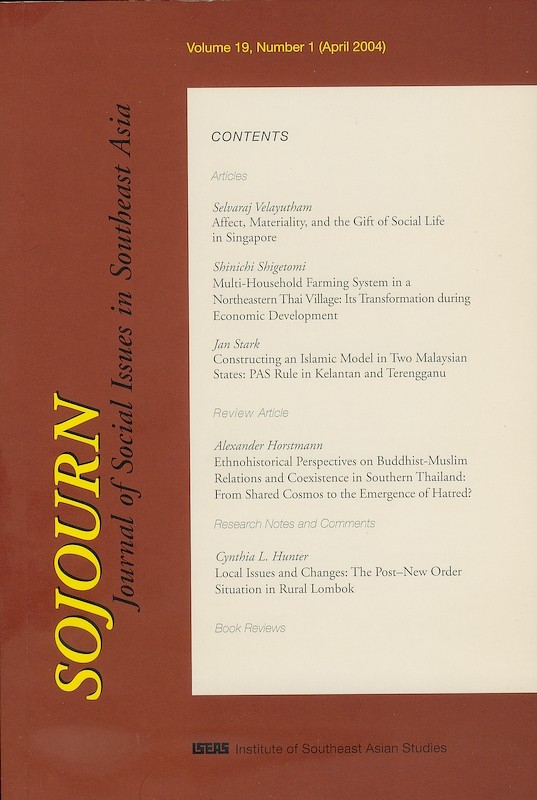
Date of publication:
May 2004
Publisher:
Institute of Southeast Asian Studies
Number of pages:
150
Code:
SJ19/1
Contents
-
SOJOURN: Journal of Social Issues in Southeast Asia Vol. 19/1 (April 2004)
-
Preliminary pages
- ARTICLES
-
Affect, Materiality, and the Gift of Social Life in Singapore, by Selvaraj Velayutham, author see abstractThis paper draws on research data gathered from an Internet discussion forum, e-mail survey, and newspaper report to examine the question of national identity and belonging in Singapore. It considers how Singaporean citizens relate to the kinds of discourses on national identity presented by the government and articulate their experiences and sense of belonging to the Singapore nation. It argues that the governments approach to nation-building based on economic developmentalism and survivalism has created an ambivalent and tenuous relationship of mutual obligation between the individual and the nation-state. It is therefore crucial that the basis of national identity is dislodged from the ideology of survivalism if an ethical practice of obligation/reciprocity is to emerge.
-
Multi-Household Farming System in a Northeastern Thai Village: Its Transformation during Economic Development, by Shinichi Shigetomi, author see abstractFarming households with close kinship ties in northeast Thailand have long been practising joint utilization of farmland. They used this multi-household farming method even more actively to cope with the macroeconomic development beginning in the 1960s. A 1989 survey of a village by the author found more than one-third of farmland under such communal use. However, the share decreased drastically by 2000. Economic growth has reached a point where farmers have to discard the communal system and introduce a market system of land utilization, such as sharecropping even between households of close kin.
-
Constructing an Islamic Model in Two Malaysian States: PAS Rule in Kelantan and Terengganu, by Jan Stark, author see abstractThis paper deals with the various meanings attached to the models of Islamic governance in contemporary Malaysia, particularly with the ones introduced by Parti Islam SeMalaysia (PAS). Rather than highlighting the clash between Islamic fundamentalism and the state, it tries to show how Islamic discourses of modernity and traditionalism have been interwoven by acquiring new and often ambiguous meanings in a multitude of ways: From its nationalist roots PAS has turned to the shia-style Islamic state to advocate Islamic democracy and civil society after the sacking of Anwar Ibrahim in 1998, and the ensuing calls for more political transparency and reliability. Since the events of September 11, PAS has been forced back to its Islamist basics to secure the core support of conservative Malay voters in the east coast states of Kelantan and Terengganu.
- REVIEW ARTICLE
-
Ethnohistorical Perspectives on Buddhist-Muslim Relations and Coexistence in Southern Thailand: From Shared Cosmos to the Emergence of Hatred?, by Alexander Horstmann, author see abstractThis review article of ethnological literature on the area straddling southern Thailand and peninsular Malaysia is the authors first attempt to show the historical development of Muslim-Buddhist relations in the period 19692002. The literature mirrors the transformation of Muslim-Buddhist relations from shared cosmos to the mobilization of hatred by illustrating the local institutions of coexistence (intermarriage, local beliefs in common ancestors, syncretism in healing practices, reciprocity in cultural niches, and the transformation and collapse of these institutions by extra-local factors, the impact of the state and globalization, illustrating the diversity of Muslim-Buddhist relations in southern Thailand.
- RESEARCH NOTES AND COMMENTS
-
Local Issues and Changes: The Post New Order Situation in Rural Lombok, by Cynthia L Hunter, author see abstractThe last few years in Indonesia have seen many changes occurring as a result of unprecedented events a financial crisis in 1997, the downfall of Soeharto's New Order in 1998, the instability of several governments 19982001, all amidst religious, economic, and ethnic disturbances and violence in many areas in Indonesia. At the same time laws of decentralization and regional autonomy provide new processes incorporating a democratic response and reaction to Soeharto's New Order. This paper explores local issues concerning the consequences of recent changes in Indonesia for village people in eastern Indonesia. Issues include access to health procurement for village people who have recently experienced the financial crisis, the downfall of the New Order government, structural changes in the administration of internal affairs, regional autonomy, and the reassertion of cultural and regional associations.
- BOOK REVIEWS
-
BOOK REVIEW: Living Silence: Burma under Military Rule. By Christina Fink, by Tin Maung Maung Than, author
-
BOOK REVIEW: Trans-Status Subjects: Gender in the Globalization of South and Southeast Asia. Edited by Sonita Sarker and Esha Niyogi De, by Deirdre McKay, author
-
BOOK REVIEW: Custodians of the Sacred Mountains: Culture and Society in the Highlands of Bali. By Thomas Reuter, by Henk Schulte Nordholt , author
-
BOOK REVIEW: Opusculum de Sectis apud Sinenses et Tunkinenses (A Small Treatise on the Sects among the Chinese and Tonkinese): A Study of Religion in China and North Vietnam in the Eighteenth Century. By Father Adriano di St. Thecla, by Pham Thu Thuy, author
-
BOOK REVIEW: People Like Us: Sexual Minorities in Singapore. Edited by Joseph Lo and Huang Guoqin, by Mun-Hou Lo, author
-
BOOK REVIEW: Politics and the Press in Indonesia: Understanding an Evolving Political Culture. By Angela Romano, by Ariel Heryanto, author

